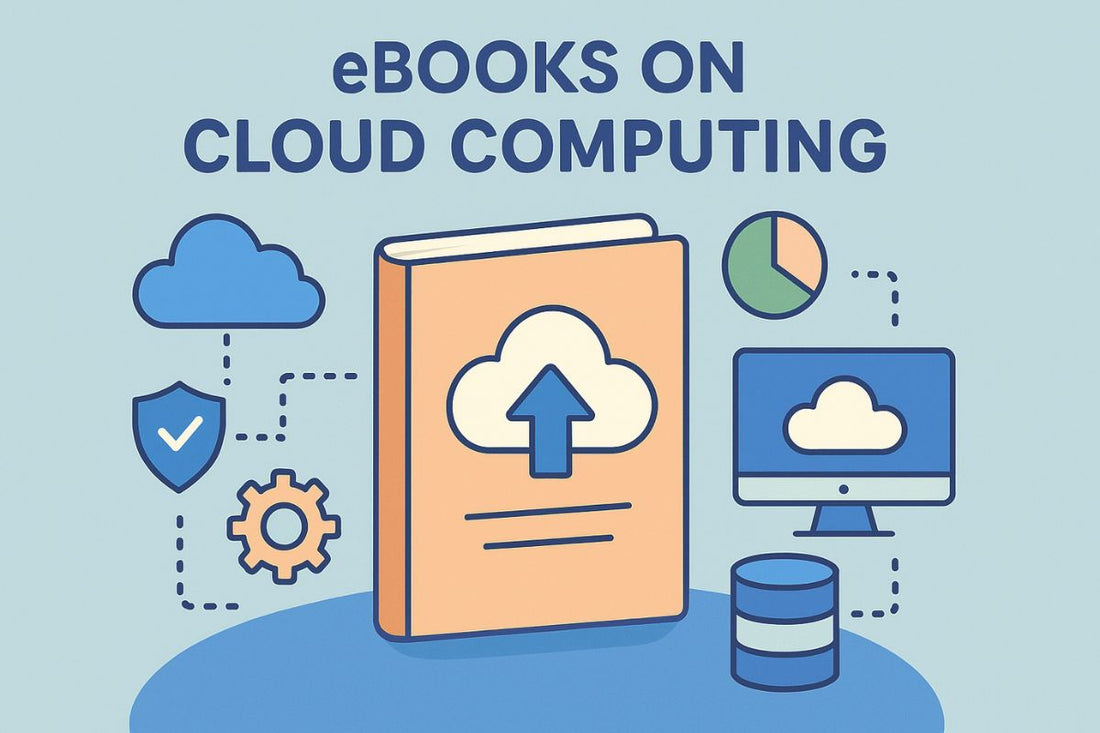
Cloud Computing Books to Read this season
Festivals are a great time to learn something new. While everyone’s lighting diyas and enjoying sweets, you can light up your career: a few good cloud-computing books can give you the concepts, the confidence, and the practical know-how to step into cloud roles, prepare for certifications, or just understand how the internet’s invisible infrastructure works.
Below are seven well-regarded books — from beginner-friendly explainers to deep technical references — with short, friendly explanations of what each book delivers, who it’s best for, and why you might pick it up.
✨ Explore Top eBooks on Cloud Computing
Explore top cloud computing books covering basics, security, and strategy.
View ebooks Details & Pricing
1. Cloud Computing: Concepts, Technology & Architecture — Thomas Erl, Ricardo Puttini, Zaigham Mahmood

Why read it: This is a foundational textbook that explains the key concepts, service models (IaaS, PaaS, SaaS), architectural patterns, and governance considerations in a structured way. It’s academic in tone but very thorough.
Ideal for: Students, architects, and anyone who wants a principled, model-based understanding of cloud computing rather than only vendor-specific how-tos.
What you’ll get: Clear definitions, conceptual diagrams, and the architectural vocabulary you’ll use in interviews or design conversations. If you plan to design cloud systems rather than just use cloud services, this book gives you the mental models you need.
2. Mastering Cloud Computing: Foundations and Applications Programming — Rajkumar Buyya, Christian Vecchiola, S. Thamarai Selvi

Why read it: This is a practical yet comprehensive book that mixes theory with hands-on examples and programming exercises. It covers cloud foundations and also explores application development and deployment on cloud platforms.
Ideal for: Developers, computer-science students, and engineers who want to build and deploy apps on cloud platforms — not just consume services.
What you’ll get: A combination of conceptual clarity and practical labs. The programming examples help you translate theory into working cloud apps.
3. Cloudonomics: The Business Value of Cloud Computing — Joe Weinman

Why read it: Cloud decisions are economic decisions. Cloudonomics dives into the business side of cloud: cost models, value drivers, and strategies for using cloud to improve agility and reduce total cost of ownership.
Ideal for: Managers, product owners, CTOs, and anyone involved in cloud procurement or ROI discussions. Also valuable for engineers who want to present business cases to stakeholders.
What you’ll get: Frameworks to evaluate cloud investments, ways to articulate value, and examples of how cloud changes business economics.
4. Architecting Cloud Computing Solutions — Kevin L. Jackson, Scott Goessling

Why read it: This book is a practical guide to designing cloud solutions for enterprise scenarios. It contains case studies and implementation guidance that help bridge ideal architectures and real world constraints.
Ideal for: Solution architects, senior engineers, and IT managers who need to translate business requirements into secure, scalable cloud architectures.
What you’ll get: Practical design patterns, checklists, and real-world lessons that prepare you to architect systems on AWS, Azure, GCP, or hybrid clouds.
✨ Explore Top eBooks on Cloud Computing
Explore top cloud computing books covering basics, security, and strategy.
View ebooks Details & Pricing
5. Cloud Security and Privacy — Tim Mather, Subra Kumaraswamy, Shahed Latif

Why read it: Security is often the top concern when teams consider moving to the cloud. This book covers threats, controls, compliance, and privacy implications of using cloud services. It’s one of the more respected introductions to cloud security principles.
Ideal for: Security engineers, compliance officers, DevOps engineers, and architects who must design or audit cloud systems.
What you’ll get: A framework for thinking about identity, data protection, governance, risk, legal issues, and practical controls for cloud environments.
6. Cloud Computing For Dummies — Judith S. Hurwitz, Robin Bloor, Marcia Kaufman, Fern Halper (and others depending on edition)

Why read it: Don’t let the “Dummies” brand fool you — this is an intentionally simple, friendly primer that introduces cloud concepts in plain English. It’s made to remove intimidation and give you a clear map of the landscape.
Ideal for: Absolute beginners, business stakeholders, and non-technical decision makers who want to understand what cloud is and why it matters without getting lost in jargon.
What you’ll get: Straightforward explanations, easy analogies, and a gentle introduction to cloud terminology and common use cases.
7. Explain the Cloud Like I’m 10 — (short, friendly explainers—author depends on edition)

Why read it: This style of book is deliberately playful and visual — it uses simple language and metaphors to explain complex ideas. If you want a fast, intuitive grasp of cloud concepts, this book is ideal.
Ideal for: Readers who prefer intuitive, visual explanations — beginners, educators, and parents introducing technology to kids or newcomers.
What you’ll get: A quick, memorable tour of cloud ideas that makes later technical reading easier because you’ve already internalized the core metaphors.
How to pick the right book for you
- If you’re brand-new to cloud: Start with Cloud Computing For Dummies or Explain the Cloud Like I’m 10 to get confident with the vocabulary.
- If you want depth and architecture: Cloud Computing: Concepts, Technology & Architecture is the solid foundation.
- If you want hands-on dev skills: Mastering Cloud Computing pairs concepts with code and practical examples.
- If you focus on security or compliance: Cloud Security and Privacy is essential reading.
- If you need to justify cloud to stakeholders: Read Cloudonomics for the economic framing.
- If you design enterprise systems: Architecting Cloud Computing Solutions gives practical architecture guidance.
A short study plan (how to use books effectively)
- Start light: One beginner book to build vocabulary (1–2 weeks).
- Choose a focus: Pick either architecture, security, or hands-on dev and read a focused book (3–4 weeks).
- Practice: Use cloud free tiers (AWS Free Tier, Azure trial, GCP credits) to try examples from the books.
- Pair with tools: Learn a CLI (AWS CLI/Azure CLI), Terraform basics, or Docker to make the learning stick.
-
Repeat: Revisit architecture or security books after hands-on practice — concepts become clearer after you’ve tried things.
Final note
Cloud computing is a broad field — there’s no single “one-size-fits-all” book. The seven books above give you different entry points: plain English, business economics, architecture, security, and hands-on programming. Pick one that suits your immediate goal (certification, career change, or just curiosity), set aside focused reading time during the festival break, and pair the book with a small hands-on project. Happy reading — and happy upskilling!
✨ Explore Top eBooks on Cloud Computing
Explore top cloud computing books covering basics, security, and strategy.
View ebooks Details & Pricing🎉 Diwali Growth Picks 🎁
This festive season, upgrade your learning & workspace with these handpicked guides, ebooks, and collections ✨
📌 Bonus Reads for Your Growth Space
Set up a productive & inspiring learning space with these curated guides:
🌱 The right tools, books & setup will make your self-growth and learning journey in tech brighter this festive season.
